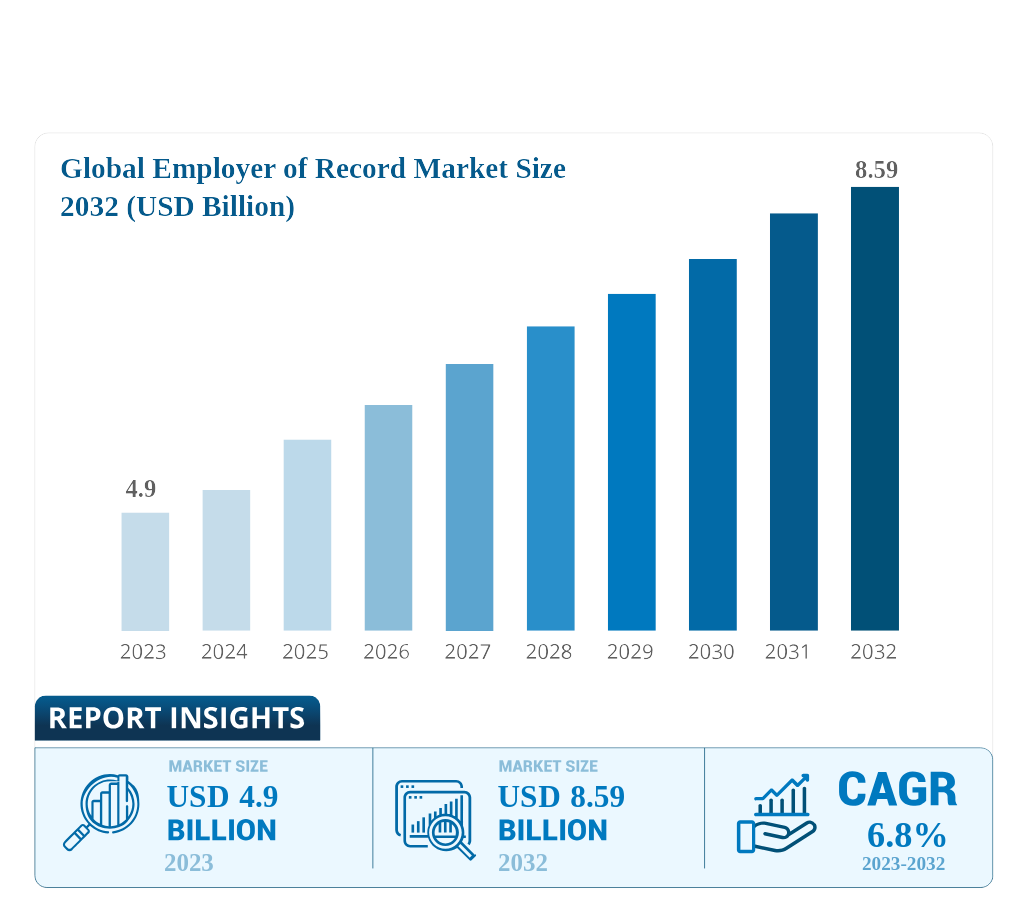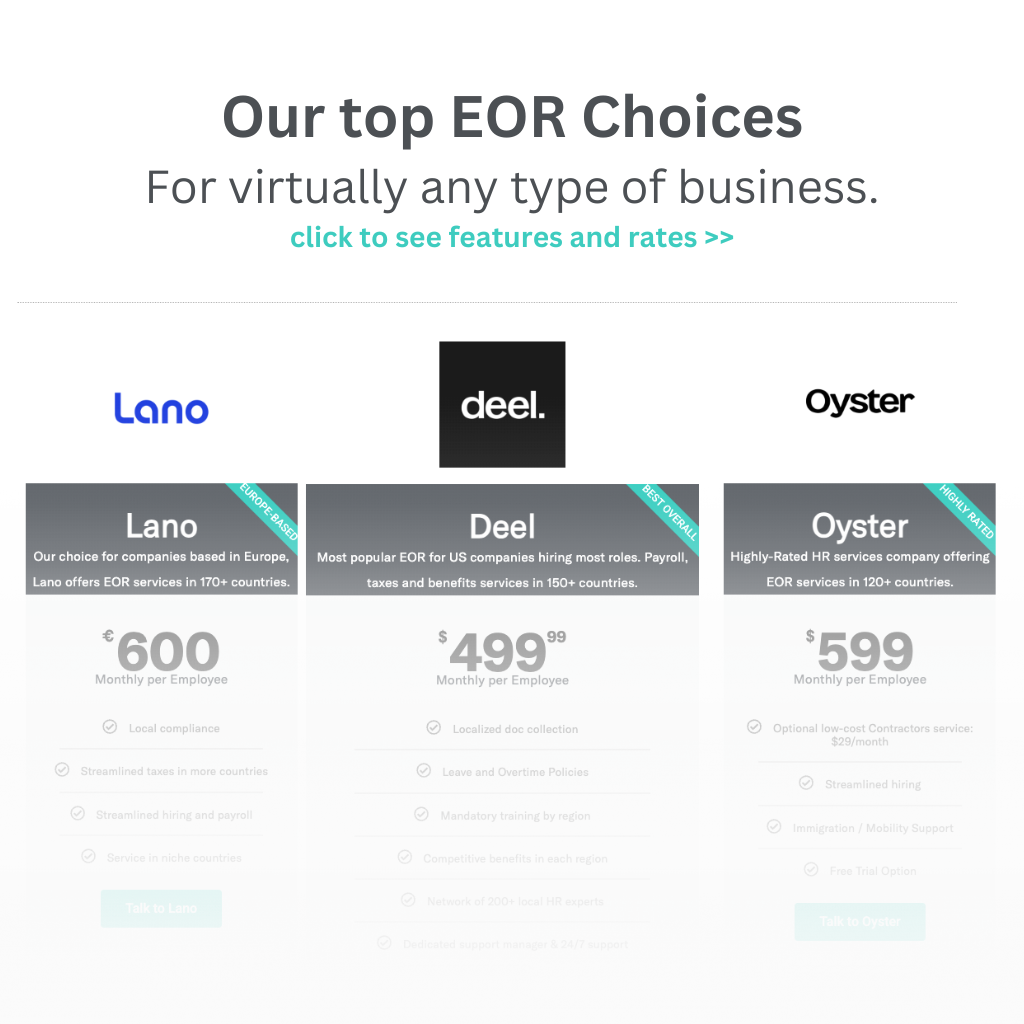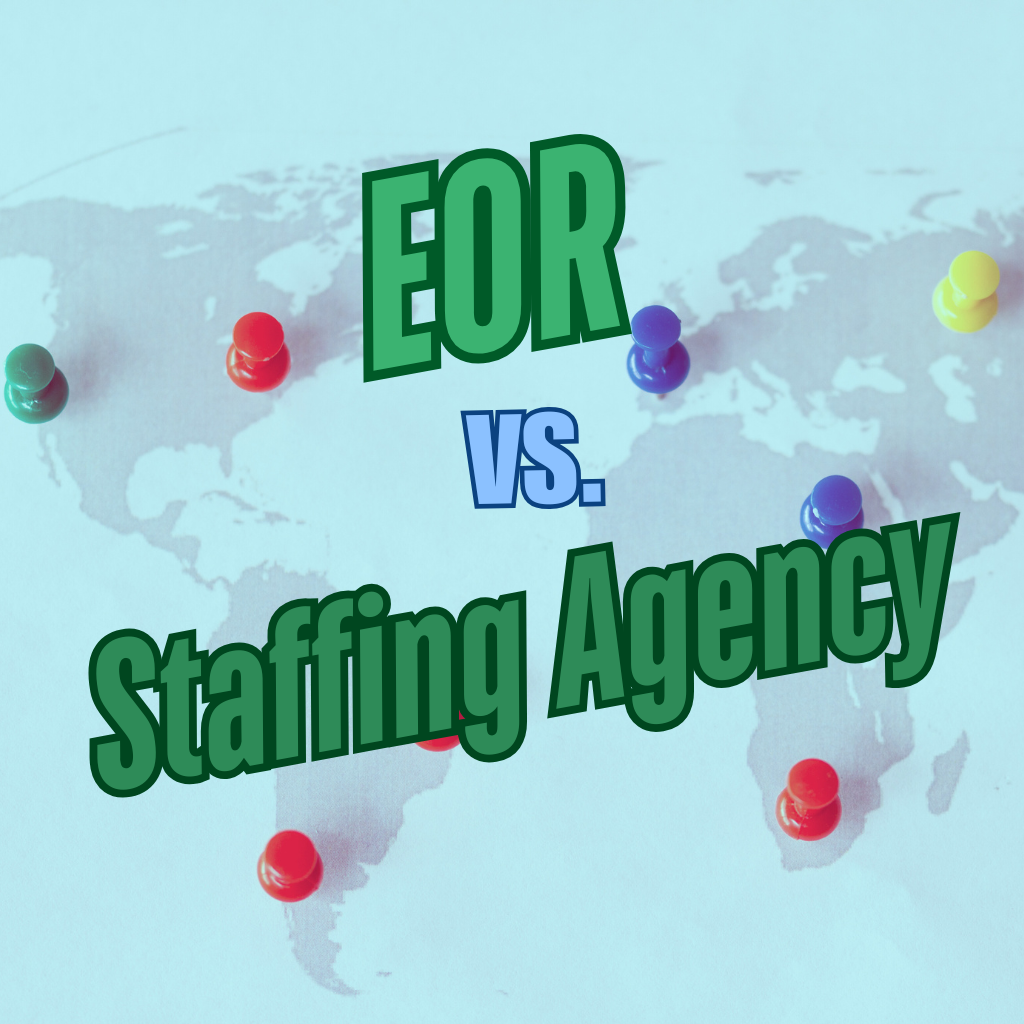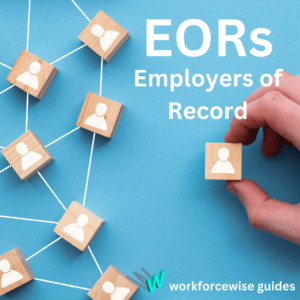What Is an Employer of Record (EOR)?
An Employer of Record (EOR) is like a behind-the-scenes partner that helps you hire employees in other countries without all the hassle. They officially become the legal employer for your international hires, handling things like payroll, benefits, taxes, and ensuring you’re playing by the local labor rules. Meanwhile, you get to focus on managing your employees’ day-to-day work.
Key Features of an EOR
- Legal Employer: The EOR takes on all legal responsibilities for your employees in their country, so you don’t have to.
- Administrative Tasks: Payroll, taxes, benefits, compliance—they’ve got it covered.
- Global Hiring Simplified: An EOR lets you hire workers in new countries without setting up a legal entity, saving you loads of time and money.
- Cost-Effective Expansion: Skip the heavy upfront costs of establishing local offices and still expand your global footprint.
Example: Imagine you’re a U.S.-based tech startup that wants to hire a marketing manager in Japan. Instead of dealing with Japanese labor laws, currency conversions for payroll, and setting up a Japanese entity, you work with an EOR. They make sure your new hire gets paid on time in yen, receives all required benefits, and stays compliant with Japanese labor regulations.
Definition: A “legal entity” is a registered business structure that allows a company to operate in a specific country, hire employees, and pay taxes there. Creating one is complex and expensive, especially for smaller operations.
What Does a Staffing Agency Do?
Staffing agencies are your go-to for temporary, contract, or project-based hires. They help you find candidates quickly, often for short-term needs. While they might handle payroll for those workers, they’re not the legal employer and usually don’t deal with in-depth compliance or benefits administration.
Key Functions of a Staffing Agency
- Candidate Sourcing: They tap into their networks and databases to find the right talent for your needs.
- Screening and Matching: Agencies screen candidates to ensure they’re a fit for your role and company.
- Temporary Hiring: Perfect for filling short-term or project-specific roles without long-term commitments.
Example: Let’s say you’re a U.K.-based company that needs a data analyst for a three-month project. A staffing agency finds a qualified candidate quickly, but you’ll need to make sure you’re following U.K. labor laws for the duration of their employment.
Definition: “Temporary hiring” means bringing on employees for a fixed period or specific project, often without the same benefits as permanent roles.

How Does Compliance Differ Between EORs and Staffing Agencies?
EORs: They’re the compliance experts. From tax withholding to employment contracts and mandatory benefits, they ensure you’re aligned with local labor laws, which reduces the risk of fines or legal trouble.
Staffing Agencies: They provide limited compliance support, mainly focusing on finding and placing candidates. The employer must handle most legal and regulatory obligations.
Example: If a Canadian tech firm hires an engineer in India via an EOR, the EOR ensures compliance with Indian labor laws, including contributions to social security and providing paid leave. With a staffing agency, the firm would need to manage these requirements directly.
Definition: “Compliance” is about following all applicable laws and regulations related to employment, such as wages, taxes, and benefits.
What Are the Cost Differences Between an EOR and a Staffing Agency?
EOR Costs: These are typically subscription-based, with fees depending on how many employees you’re hiring. They cover everything from payroll to compliance and benefits administration.
Staffing Agency Costs: Usually a one-time fee or a percentage of the hired candidate’s salary. The employer handles ongoing costs like payroll and compliance.
Example: Hiring a software developer in Brazil through an EOR might cost a monthly fee per employee, covering all employment-related services. Using a staffing agency, you’d pay a 15-20% placement fee upfront but handle all legal and payroll obligations on your own.
When Should You Choose an Employer of Record?
- International Expansion: If you’re entering a new country and don’t have a local entity, an EOR is the way to go.
- Compliance and Risk Management: Perfect for avoiding the headache of navigating foreign labor laws.
- Long-Term Workforce: Best for stable, ongoing employment needs.
Example: A German company wants to hire a customer service rep in South Korea. With an EOR, the employee gets paid in Korean won, receives required benefits like severance pay, and everything complies with South Korean labor laws.
When Is a Staffing Agency the Better Choice?
- Temporary or Project-Based Roles: Great for filling short-term needs or specialized projects.
- Direct Control: Ideal if you want hands-on management of the workers.
- Quick Hiring: Staffing agencies excel at providing candidates fast, sometimes within 24 hours.
Example: A U.S. retailer needs extra staff for the holiday season. A staffing agency quickly supplies pre-screened workers ready to hit the ground running. However, the retailer remains responsible for compliance, such as overtime pay.

What Are the Key Differences Between EORs and Staffing Agencies?
| Feature | Employer of Record (EOR) | Staffing Agency |
|---|---|---|
| Legal Employer | Yes | No |
| Compliance Responsibility | Full | Limited |
| Payroll, Taxes, Benefits | Managed by EOR | Payroll only |
| Hiring Flexibility | Long-term and short-term | Primarily short-term |
| Control Over Employees | Moderate | High |
| Cost Structure | Subscription-based | Placement fees |
How Can EOR Services Save Time and Money?
EORs make global hiring straightforward by taking on:
- Payroll and Benefits: Employees get paid in their local currency, on time, with full benefits.
- Compliance Management: They mitigate legal risks by staying updated on local labor laws.
- No Need for Legal Entities: Save the significant costs and delays of setting up subsidiaries.
Example: Expanding into China can take months and significant capital to establish a legal entity. An EOR lets you onboard employees in weeks, ensuring compliance with Chinese labor laws and managing required benefits.
How Does the Future Look for Global Staffing?
The global staffing market is set to grow by 5% in 2025, reaching $650 billion. Key contributors include:
- The Americas: Account for 35% of global revenue.
- EMEA (Europe, Middle East, and Africa): Generate 40% of revenue.
- APAC (Asia-Pacific): Contribute 24% of revenue.
Which Option Is Right for Your Business?
- Choose an EOR: When you need compliant, long-term hiring in new countries.
- Choose a Staffing Agency: For short-term or project-specific roles that require quick placements.
Key Takeaway
EORs and staffing agencies offer unique benefits. For global expansion and long-term hiring, an EOR is your best bet. For temporary or specialized roles, a staffing agency can deliver fast results.





